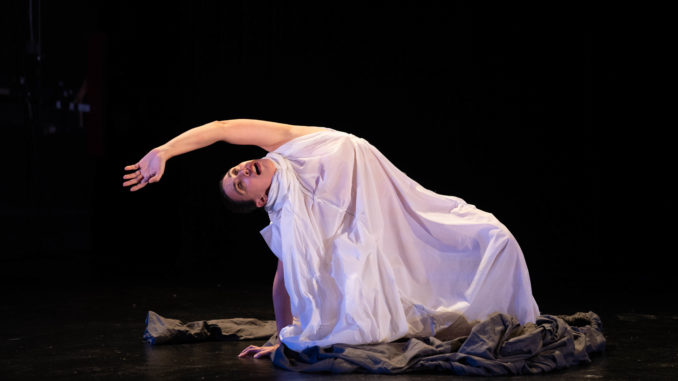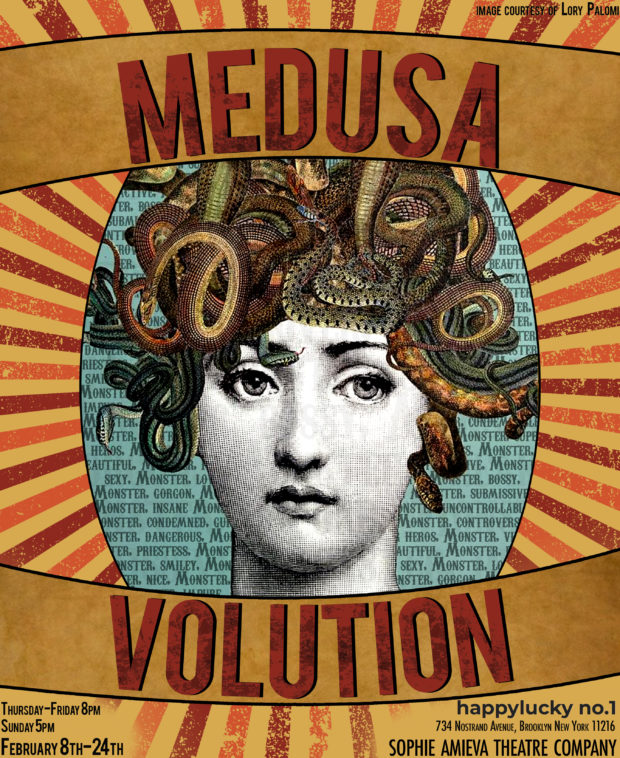
Review Fix chats with Sophia Amieva about her new production, “Medusa Volution.â€

About Sophia Amieva:
SOPHIE AMIEVA (Writer, Director) is a French and Spanish theater artist living in Brooklyn since 2001. Praised by the New York Times for “display[ing] a fine talent for comedy,†Sophie has performed with Philippe Genty Company, NTUSA, International Wow, Bindlestiff Family Circus and 600 Highwaymen, and toured for two years with the French grotesque and masque street theater collective “La Grappe de Bouffons.†In New York City, she has been seen in many venues including the Ohio Theater, Theater for a New City and La MaMa Annex. At HERE she has presented Pessimist, Moi?!, a one woman show about femininity and loneliness. Sophie’s recent work as a creator and director includes Facets, a silence piece with giant masks and an artistic tool she calls “The Diamond†(an improvisational dance game, which took place weekly during six months in the window of an art gallery). And last year, she presented Medusa, a first version of this play. Her recent directorial work includes also Bremen Freedom and The Infernal Machine for ETW main stage at NYU, where she has been teaching Bouffons, mask and clowning for over 12 years.
About the Production:
Expressed through grotesque storytelling, the Japanese Dance of Darkness (Butoh), and a chorus of women representing the feminine archetypes born from the Medusa myth, Medusa Volution places Medusa front, center and on trial; presenting a vivid enquiry into the maligned Monster Woman. The trial sprawls through time, calling for the testimony of contemporary women as well as their mythological sisters, like Salome and Eve. As we explore the narratives of so many women, we redefine the stories of their power, agency and pleasure; making visible how we may be complicit in one another’s oppression and how we might support one another’s liberation. Today, can we look Medusa in the eyes?
Medusa Volution plays the following schedule through February 24th:
Thursdays through Saturdays at 8:00 P.M.
Sundays at 5:00 P.M.
Tickets are $20.00 ($15.00 Students/Artists/Seniors)and are currently available to purchase at www.artful.ly/sophie-amieva
Review Fix: What inspired Medusa Volution?
Sophia Amieva: I was always fascinated by Medusa, the Gorgon, since I was a little girl reading my first books about Greek mythology. Her looks and power troubled me; her curse and decapitation even more so. The arc of her life story had always left me deeply unsatisfied. I rediscovered her story once more whilst reading Greek mythology story books to my own young daughters. I found myself once again disturbed by her story especially how, after she was raped by Poseidon in Athena’s Temple, Athena punished Medusa by transforming her into a monster. Reading the story to my daughters felt like a punch in the stomach. It felt deeply wrong. What was I doing passing on old patriarchal point of views without any critical arguments to protect them? From that point I began by researching mythology, revisiting art history, and investigating the role of women. That started three years ago.
Review Fix: Why does this production matter?
Amieva: It matters because this is not a well examined history, yet it is told over and over again. Mythology, like any story, was fabricated. That fabrication almost always favors those in power at the time. It is crucial to put the stories of Medusa in their historical context to show that violence against women is part of our cultural history and it informs our culture today.
It is important to understand Rape culture, to see its pattern. Last year, the #metoo movement emerged during rehearsals, which was validating and almost overwhelming for us at the time. I mean Medusa is in the news everyday, take for example this Fall with the televised testimonies of Christine Blasey Ford.
This show is centered on a chorus of women representing the feminine archetypes embedded in and born from the myth: the monster, the virgin, the temptress, the prostitute, the huntress. Through the chorus we tell stories of Salome, Eve, and conduct a “Trial of Medusa,†presenting a vivid enquiry into the maligned Monster Woman.
The trial of Medusa sprawls through time, calling for the testimony of contemporary women as well as their mythological sisters. The women of the chorus experience the suppression of their power, and the suffocation of their sexual pleasure. As they explore the narratives of so many women, we redefine the stories of our power, agency and sexual pleasure. The trial makes visible how we may be complicit in one another’s oppression and how we might support one another’s liberation.
Review Fix: What does Medusa mean to you?
Amieva: When I started to read and research, I realized how deeply Medusa was embedded in my theatrical work whether I’ve been conscious of it or not. It has been a painful process recognizing the objectification of women and ubiquity of the male gaze. Being a woman and a mother, I could identify with Medusa and understand her anger.
Ultimately the digging has paid off: there are some empowering discoveries. Medusa represents a powerful women in Ancient Greece –a priestess with real power in the life of the city. Going back further in the prehistoric times, she was a goddess, a snake Goddess.
So I began to write about Medusa, about her isolation and her anger, but also her power. I felt driven to write about myself. In the rehearsal room, I find myself pulling from disciplines I had kept separate: dance, clown, masks and chorus.
During this process, I am finally actively connecting dots not only for myself and all the roles I inhabit in my life, but also as an artist, and the many disciplines I have practiced.
Review Fix: Who will enjoy this production the most?
Amieva: Anyone interested in seeing the conversation on women and power explored in highly theatrical, entertaining, humorous and vulnerable ways. Bouffon, satire, butoh and clown are all relatively rarely used theatrical tools that were specially created to highlight some of the things our society is grappling with right now, with artistry, comedy and virtuosity.
Review Fix: Bottom line, how do you want it to be remembered?
Amieva: As a show that reminded audiences that History is messy and we have to be aware of who tells the stories and why. I hope our audiences gain respect for Medusa as we have: Medusa represents a history of women that can allow us to understand ourselves and see the flaws of, and sometime our own complicity in, our patriarchal society.
Review Fix: What’s next?
Amieva: Following my thread, continuing my research. With my team we are working next on an ambitious project to bring to large audiences stories about goddesses and amazons- the great women of mythology!.


Leave a Reply